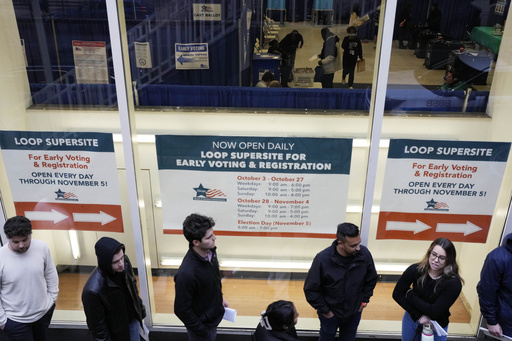
Voters in the recent presidential election have identified the economy and immigration as the primary challenges currently facing the nation. However, the state of democracy emerged as a significant influence for many Americans who participated in the voting process on Tuesday.
An extensive survey known as VoteCast, encompassing over 110,000 voters from across the country, revealed a populace disillusioned and yearning for change, prompted by a stark choice between the former President Donald Trump and Vice President Kamala Harris.
Trump, representing the Republican side, framed the election as a critique of the Biden-Harris administration, attributing rising inflation and increased illegal border crossings to their policies. Conversely, Harris, the Democratic nominee, positioned herself as a forward-looking candidate and portrayed Trump as outdated, fatigued, and a potential danger to the Constitution.
Approximately 40 percent of voters pinpointed the economy and employment as the nation’s foremost concern, reflecting ongoing frustration stemming from the inflation surge experienced in 2022, which has led to higher costs in groceries, housing, and gas. Around 20 percent regarded immigration as the most pressing issue, while about 10 percent chose abortion as their top priority.
Despite these concerns, when voters were asked about what influenced their decision most significantly, about half cited the future of democracy as the paramount factor. This sentiment surpassed concerns over inflation, immigration, abortion policy, or freedom of speech.
Issues surrounding Trump’s assassination attempts or his ongoing legal troubles, as well as the historic prospect of Harris becoming the first female president, seemed to take a backseat to these overarching concerns.
In terms of economic capabilities, Trump appeared to have the upper hand in voters’ perceptions, while Harris was considered the stronger candidate on abortion matters. Throughout the campaign, Harris emphasized abortion access and women’s healthcare as fundamental rights. In contrast, Trump argued that abortion regulation was best managed at the state level following the Supreme Court’s decision to overturn Roe v. Wade in 2022.
Trump advocated for measures such as tariffs on both competitors and allies and an increase in domestic oil production to boost the economy, while Harris countered that Trump’s tariffs would exacerbate inflation. She proposed tax incentives for families and assistance aimed at first-time homeowners and new business founders as more effective solutions.
The sentiment among voters clearly indicated a desire for change, with about 80 percent expressing a need for at least “substantial change” in governance; around 25 percent even advocated for complete and total transformation. However, opinions diverged on what such change should entail.
Consequently, the different visions offered by Harris and Trump became apparent during this unparalleled campaign season. Harris, who distinctly identifies as a woman of color, emerged as a candidate in July, following Biden’s exit due to concerns over his age. The 78-year-old Trump, meanwhile, faced two assassination attempts and legal issues stemming from his business activities during his presidential tenure.
Around 70 percent of voters believed that the nation was heading in the wrong direction, with Trump promoting a return to his previous administration as a solution, while Harris insisted her policies aimed for a forward-thinking approach.
Concerns about the economy remained prevalent, with approximately 60 percent of respondents labeling the economy as either not so good or poor—mirroring sentiments from four years prior when government aid buffered the economy during the pandemic. Post-pandemic, inflation surged due to various factors, including supply chain disruptions and increased consumer demand bolstered by government relief. The effects of rising food and energy costs, particularly following Russia’s invasion of Ukraine in 2022, were also notable.
Two-thirds of voters expressed significant anxiety regarding food prices and grocery costs. Nearly half also reported worries about healthcare, housing expenses, and gasoline prices.
While almost 60 percent indicated that their financial situation was stable, about 30 percent felt they were “falling behind,” a notable increase compared to 2020 statistics.
Nonetheless, both candidates’ political backgrounds raised critical questions for many voters. Harris’s tenure as Biden’s vice president and her rapid rise within the Democratic Party led about 25 percent to view her as inexperienced—a description that Trump, with his previous term as president, avoided facing.
On the other hand, Trump’s incendiary rhetoric against perceived adversaries resonated with many voters amid fears that his refusal to accept his 2020 electoral defeat contributed to the January 6 Capitol insurrection. Nearly 60 percent conveyed considerable or moderate worries that another Trump presidency could push the U.S. toward authoritarianism, where a single leader wields unchecked power; slightly fewer than half expressed similar concerns about Harris.
